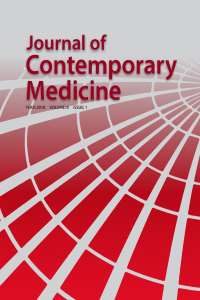Covıd-19 tanılı Geriatrik Yoğun Bakım Hastalarında D Vitamini Desteği Sitokin Fırtınasını ve Mortaliteyi Azaltır mı?
Geriatrik Popülasyon, COVID-19, Sitokin Fırtınası, Yoğun Bakım Üniteleri, D Vitamini
Does Vitamin D Supplementation Reduce Cytokine Storm and Mortality in Geriatric Intensive Care Patients Diagnosed with COVID-19
ELDERLY PATIENTS, COVID-19, Cytokine Release Syndrome, IntensiveCareUnits, Vitamin D,
___
- 1. World HealthOrganization. (2020). Coronavirusdisease 2019 (COVID-19): situationreport, 82.
- 2. EpidemiologyWorkingGroupforNCIPEpidemicResponse, Chinese Center forDisease Control and Prevention. ZhonghuaLiuXing Bing XueZaZhi 2020;41(2):145-51 (PMID: 32064853)
- 3. Lu D, Zhang J, Ma C, et al. Link betweencommunity-acquired pneumoniaand vitamin D levels in olderpatients. Z GerontolGeriatr 2018;51(4):435-9 (PMID: 28477055)
- 4. BeardJA, Bearden A, Striker R. Vitamin D andthe anti-viral state. J ClinVirol 2011 50(3):194-200 (PMID: 21242105)
- 5. Greiller CL, Martineau AR. Modulation of theimmuneresponsetorespiratoryvirusesby vitamin D. Nutrients 2015;7(6):4240-70 (PMID: 26035247)
- 6. Teymoori-Rad M, Shokri F, Salimi V, et al. The inter play between vitamin D and viral infections. RevMedVirol 2019;29(2):e2032 (PMID: 30614127)
- 7. Trovas G, Tournis S. Vitamin D and COVID-19. Hormones (Athens) 2021;20:207-8. (PMID: 32666357)
- 8. Vásárhelyi B, Sátori A, Olajos F, et al. Low vitamin D level samong patients at Semmelweis University: retrospective analysis during a one-year period. OrvHetil 2011; 52(32):1272-7 (PMID: 21803724)
- 9. Conti P, Ronconi G, Caraffa A, et al. Induction of pro-inflammatorycytokines (IL-1 andIL-6) and lung inflammation by Coronavirus-19 (COVID-19 or SARS-CoV-2): anti-inflammatory strategies. J Biol Regul Homeost Agents 2020;34(2):327-31 (PMID: 32171193)
- 10. Ardizzone S, Cassinotti A, Trabattoni D, et al. Immunomodulatoryeffects of 1,25-dihydroxyvitamin D3 on TH1/TH2 cytokines in inflammatory bowel disease: an in vitro study. Int J Immunopathol Pharmacol 2009;22(1):63-71 (PMID: 19309553)
- 11. Zabetakis I, Lordan R, Norton C, et al. COVID-19: The Inflammation Link and the Role of Nutrition in Potential Mitigation. Nutrients 2020;12(5):1466 (PMID: 32438620)
- 12. Yan R, Zhang Y, Li Y, et al. Structural basis for there cognition of SARS-CoV-2 by full-length human ACE2. Science 2020;367(6485):1444-8 (PMID: 32132184)
- 13. Gheblawi M, Wang K, Viveiros A, et al. Angiotensin-Converting Enzyme 2: SARS-CoV-2 Receptorand Regulator of the Renin-Angiotensin System: Celebrating the 20th Anniversary of the Discovery of ACE2. CircRes 2020;126(10):1456-74 (PMID: 32264791)
- 14. LiYC, Qiao G, Uskokovic M, et al. Vitamin D: a negative endocrine regulator of the renin-angiotensinsystemandbloodpressure. J Steroid BiochemMolBiol. 2004;(1-5):387-92. (PMID: 15225806)
- 15. Hanff TC, Harhay MO, Brown TS, Cohen JB, Mohareb AM. Is There an Association Between COVID-19 Mortality and the Renin-Angiotensin System? A Call for Epidemiologic Investigations. Clin Infect Dis. 2020;71(15):870-4 (PMID: 32215613)
- 16. Binkley N, Ramamurthy R, Krueger D. Low vitamin D status: definition, prevalence, consequences, andcorrection. Endocrinol Metab Clin North Am. 2010;39(2):287-301 (PMID: 20511052)
- 17. Thomas MK, Lloyd-Jones DM, ThadhaniRI, et al. Hypovitaminosis D in medicalinpatients. N Engl J Med. 1998;338(12):777-83 (PMID: 9504937)
- 18. ALIPIO, Mark. Vitamin D Supplementation Could Possibly Improve Clinical Outcomes of Patients Infected with Coronavirus-2019 (COVID-19). Available at SSRN 3571484, 2020.
- 19. HribarCA, CobboldPH, ChurchFC. Potential Role of Vitamin D in the Elderly to Resist COVID-19 and to Slow Progression of Parkinson's Disease. Brain Sci. 2020;10(5):284. (PMID: 32397275)
- 20. Martineau AR, Jolliffe DA, HooperRL, et al. Vitamin D supplementation to preventacuterespiratory tract infections: systematic review and meta-analysis of individual participant data. BMJ 2017;356:i6583 (PMID: 28202713)
- 21. Boucher BJ. Theproblems of vitamin d insufficiency in olderpeople. Aging Dis. 2012;3(4):313-29 (PMID: 23185713)
- 22. Baktash V, Hosack T, Patel N, et al. Vitamin D status and outcomes for hospitalised older patients with COVID-19. Postgrad Med J. 2021;97(1149):442-7.(PMID: 32855214)
- 23. Grant WB, Baggerly CA, Lahore H. Reply: "Vitamin D Supplementation in Influenza and COVID-19 Infections. Comment on: Evidence That Vitamin D Supplementation Could Reduce Risk of Influenza and COVID-19 Infections and Deaths Nutrients 2020, 12(4), 988". Nutrients 2020;12(6):16-20 (PMID: 32492787)
- 24. Rhodes JM, Subramanian S, Laird E, et al. Editorial: low population mortality from COVID-19 in countriessouth of latitude 35 degrees North supports vitamin D as a factor determining severity. Aliment Pharmacol Ther.2020;51(12):1434-7 (PMID:32311755)
- 25. Panarese A, Shahini E. Letter: Covid-19, and vitamin D. Aliment Pharmacol Ther. 2020;51(10):993-5 (PMID: 32281109)
- 26. Autier P, Mullie P, Macacu A, et al. Effect of vitamin D supplementation on non-skeletaldisorders: a systematic review of meta-analyses and randomised trials. Lancet Diabetes Endocrinol 2017;5(12):986-1004 (PMID: 29102433)
- 27. Wang R, De Gruttola V, Lei Q, et al. The vitamin D for COVID-19 (VIVID) trial: A pragmatic cluster-randomized design. Contemp Clin Trials. 2021;100:106-76 ( PMID: 33045402)
- Yayın Aralığı: Yılda 6 Sayı
- Başlangıç: 2011
- Yayıncı: Rabia YILMAZ
ÇOCUK YOĞUN BAKIM ÜNİTESİNE YATAN HASTALARIN KLİNİK VE DEMOGRAFİK DEĞERLENDİRİLMESİ
İNTÖRN HEMŞİRELERİN KORONOVİRÜS (COVID-19) SALGININA İLİŞKİN ALGILARI: NİTELİKSEL BİR ÇALIŞMA
Hava GÖKDERE ÇİNAR, Dilek YILMAZ, Hülya YILMAZ
Acil Serviste İleus Tanısı Alan Hastaların Değerlendirilmesi
Çağdaş DERDİYOK, Ömer SALT, Mustafa Burak SAYHAN
CoronaVac Aşısı Sonrası Sağlık Personelinde Erken Dönem Olumsuz Etkileri
Hastanede Yatan İnme Sonrası Rehabilitasyon Hastalarında Cinsel İşlev Bozukluğunun Değerlendirilmesi
Ali Nail DEMİR, Sanem Aslıhan AYKAN, Uğur GÜNGÖR DEMİR, Hakan TUNÇ
COVID-19'da Ciddi Hastalıkla İlişkili Risk Faktörleri
Fatma ÇÖLKESEN, Esma EROĞLU, Tevhid AYDIN, Arzu TARAKÇI, Şule ÖZDEMİR ARMAĞAN, Mihriban ÇIĞCI, Fatma KACAR
Duygu AYHAN BAŞER, Cansu ALICI, Betül Sultan DEMİR, Enes Berk BİŞKİNER, Asena Merve OFLAZ, İzzet FİDANCI, Hilal AKSOY, Mustafa CANKURTARAN
Rasim Eren CANKURTARAN, Öykü TAYFUR YÜREKLİ, Naciye Şemnur BÜYÜKAŞIK, Osman ERSOY
